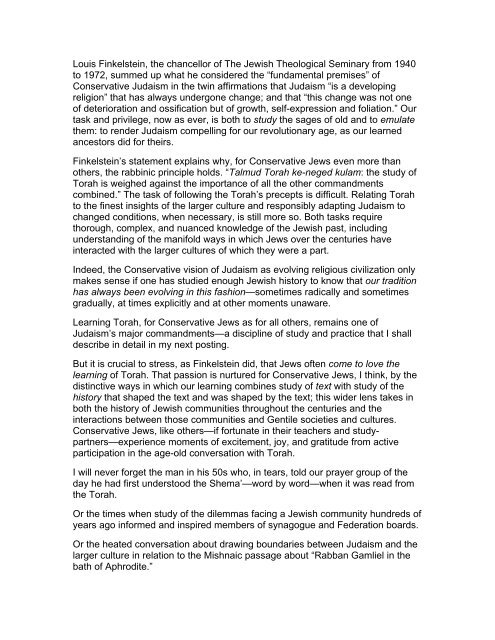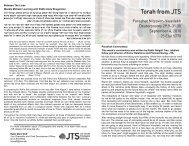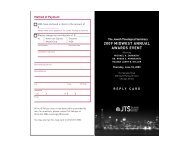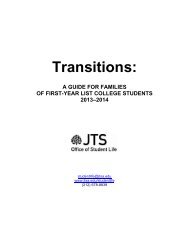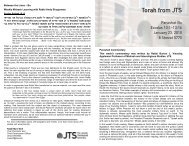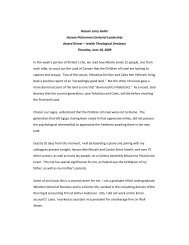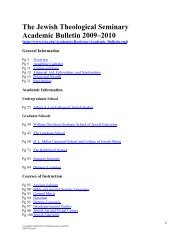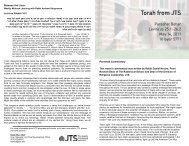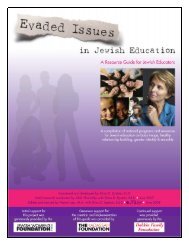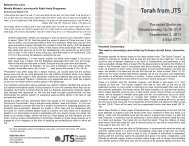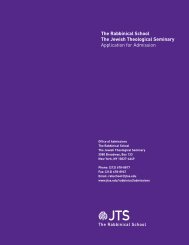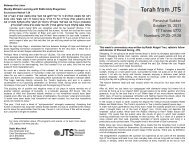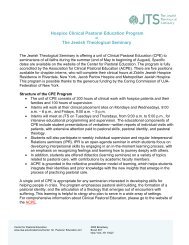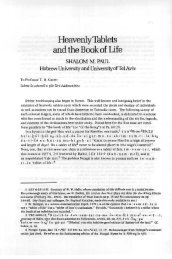Print This Essay - The Jewish Theological Seminary
Print This Essay - The Jewish Theological Seminary
Print This Essay - The Jewish Theological Seminary
You also want an ePaper? Increase the reach of your titles
YUMPU automatically turns print PDFs into web optimized ePapers that Google loves.
Louis Finkelstein, the chancellor of <strong>The</strong> <strong>Jewish</strong> <strong>The</strong>ological <strong>Seminary</strong> from 1940<br />
to 1972, summed up what he considered the “fundamental premises” of<br />
Conservative Judaism in the twin affirmations that Judaism “is a developing<br />
religion” that has always undergone change; and that “this change was not one<br />
of deterioration and ossification but of growth, self-expression and foliation.” Our<br />
task and privilege, now as ever, is both to study the sages of old and to emulate<br />
them: to render Judaism compelling for our revolutionary age, as our learned<br />
ancestors did for theirs.<br />
Finkelstein’s statement explains why, for Conservative Jews even more than<br />
others, the rabbinic principle holds. “Talmud Torah ke-neged kulam: the study of<br />
Torah is weighed against the importance of all the other commandments<br />
combined.” <strong>The</strong> task of following the Torah’s precepts is difficult. Relating Torah<br />
to the finest insights of the larger culture and responsibly adapting Judaism to<br />
changed conditions, when necessary, is still more so. Both tasks require<br />
thorough, complex, and nuanced knowledge of the <strong>Jewish</strong> past, including<br />
understanding of the manifold ways in which Jews over the centuries have<br />
interacted with the larger cultures of which they were a part.<br />
Indeed, the Conservative vision of Judaism as evolving religious civilization only<br />
makes sense if one has studied enough <strong>Jewish</strong> history to know that our tradition<br />
has always been evolving in this fashion—sometimes radically and sometimes<br />
gradually, at times explicitly and at other moments unaware.<br />
Learning Torah, for Conservative Jews as for all others, remains one of<br />
Judaism’s major commandments—a discipline of study and practice that I shall<br />
describe in detail in my next posting.<br />
But it is crucial to stress, as Finkelstein did, that Jews often come to love the<br />
learning of Torah. That passion is nurtured for Conservative Jews, I think, by the<br />
distinctive ways in which our learning combines study of text with study of the<br />
history that shaped the text and was shaped by the text; this wider lens takes in<br />
both the history of <strong>Jewish</strong> communities throughout the centuries and the<br />
interactions between those communities and Gentile societies and cultures.<br />
Conservative Jews, like others—if fortunate in their teachers and studypartners—experience<br />
moments of excitement, joy, and gratitude from active<br />
participation in the age-old conversation with Torah.<br />
I will never forget the man in his 50s who, in tears, told our prayer group of the<br />
day he had first understood the Shema’—word by word—when it was read from<br />
the Torah.<br />
Or the times when study of the dilemmas facing a <strong>Jewish</strong> community hundreds of<br />
years ago informed and inspired members of synagogue and Federation boards.<br />
Or the heated conversation about drawing boundaries between Judaism and the<br />
larger culture in relation to the Mishnaic passage about “Rabban Gamliel in the<br />
bath of Aphrodite.”


